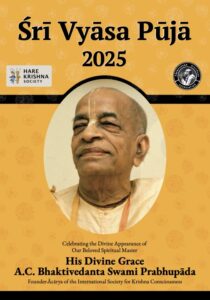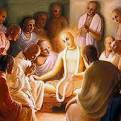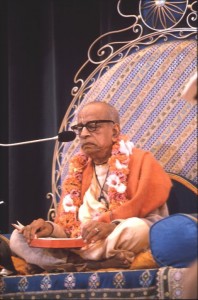A summary of below-This is an amazing SB pastime of King Citraketu who appears first as a devotee then as a demon (asura) then finally as a pure devotee. King Indra was trying to rid the heavenly planets of the Asuras who captured his planets due to his offense to his spiritual master Brhaspati and the Asuras got their power because they worshiped their spiritual master properly. When Citraketu finally got a son after having relations with thousands of his wives unsuccessfully, Angira and Narada muni came and gave him the blessing that he would get a son but his son would be both the source of happiness and lamention. This was due to the fact that his son was his enemy in a former life.
What is important is the instructions that comes out of this story about the illusions of parents thinking their children are- “their own”. Many examples are given by the sages in this story to help us understand the foolish plight of attached individuals who want a permanent situation in this world, starting with children. Prabhupada makes the valid point that one day somebody can be your friend, and the next day become your enemy. So much for creating a world of so called friends and relatives around you !! The SB compares this orbit of illusion to the foam of bubbles at the oceans edge. And what sane man will put all his faith in a bunch of bubbles?
Damaghosa das
———————–
SB 6.15.4-King Citraketu was not destined to get a child by providence, or the will of the Supreme. Just as sterile grain cannot produce more grain, a sterile person, by the will of the Supreme Lord, cannot beget a child. Sometimes a child is born even to an impotent father and sterile mother, and sometimes a potent father and fertile mother are childless. Indeed, sometimes a child is born despite contraceptive methods, and therefore the parents kill the child in the womb. In the present age, killing children in the womb has become a common practice. Why? When contraceptive methods are taken, why don’t they act? Why is a child sometimes produced so that the father and mother have to kill it in the womb? We must conclude that our arrangement of so-called scientific knowledge cannot determine what will take place; what is enacted actually depends on the supreme will. It is by the supreme will that we are situated in certain conditions in terms of family, community and personality. These are all arrangements of the Supreme Lord according to our desires under the spell of māyā, illusion. In devotional life, therefore, one should not desire anything, since everything depends on the Supreme Personality of Godhead. As stated in Bhakti-rasāmṛta-sindhu (1.1.11):
SB 6,15.5-O King, both you and us—your advisers, wives and ministers—as well as everything moving and not moving throughout the entire cosmos at this time, are in a temporary situation. Before our birth this situation did not exist, and after our death it will exist no longer. Therefore our situation now is temporary, although it is not false.
PURPORT
The Māyāvādī philosophers say, brahma satyaṁ jagan mithyā: Brahman, the living being, is factual, but his present bodily situation is false. According to the Vaiṣṇava philosophy, however, the present situation is not false but temporary. It is like a dream. A dream does not exist before one falls asleep, nor does it continue after one awakens. The period for dreaming exists only between these two, and therefore it is false in the sense that it is impermanent. Similarly, the entire material creation, including our own creation and those of others, is impermanent. We do not lament for the situation in a dream before the dream takes place or after it is over, and so during the dream, or during a dreamlike situation, one should not accept it as factual and lament about it. This is real knowledge.
SB 6.15.24-These visible objects like wife, children and property are like dreams and mental concoctions. Actually what we see has no permanent existence. It is sometimes seen and sometimes not. Only because of our past actions do we create such mental concoctions, and because of these concoctions, we perform further activities.
PURPORT-Everything material is a mental concoction because it is sometimes visible and sometimes not. At night when we dream of tigers and snakes, they are not actually present, but we are afraid because we are affected by what we envision in our dreams. Everything material is like a dream because it actually has no permanent existence.
Śrīla Viśvanātha Cakravartī Ṭhākura writes as follows in his commentary: …At night one dreams of tigers and snakes, and while dreaming he actually sees them, but as soon as the dream is broken they no longer exist. Similarly, the material world is a creation of our mental concoctions. We have come to this material world to enjoy material resources, and by mental concoction we discover many, many objects of enjoyment because our minds are absorbed in material things. This is why we receive various bodies. According to our mental concoctions we work in various ways, desiring various achievements, and by nature and the order of the Supreme Personality of Godhead (karmaṇā-daiva-netreṇa) we get the advantages we desire. Thus we become more and more involved with material concoctions. This is the reason for our suffering in the material world. By one kind of activity we create another, and they are all products of our mental concoctions.
SB 6.15.25 purport…In the Fifth Canto (5.5.4), while instructing his sons, Ṛṣabhadeva said, asann api kleśada āsa dehaḥ: the body, although temporary, is the cause of all the miseries of material existence. As already discussed in the previous verse, the entire material creation is based on mental concoction. The mind sometimes induces us to think that if we purchase an automobile we can enjoy the physical elements, such as earth, water, air and fire, combined in forms of iron, plastic, petrol and so on. Working with the five material elements (pañca-bhūtas), as well as with our five knowledge-gathering senses like the eyes, ears and tongue and our five active senses like the hands and legs, we become involved in the material condition. Thus we are subjected to the tribulations known as adhyātmika, adhidaivika and adhibhautika. The mind is the center because the mind creates all these things. As soon as the material object is struck, however, the mind is affected, and we suffer. For example, with the material elements, the working senses and the knowledge-gathering senses we create a very nice car, and when the car is accidentally smashed in a collision, the mind suffers, and through the mind the living entity suffers. The fact is that the living entity, while concocting with the mind, creates the material condition.
SB 6.16.4-By the mystic power of Nārada Muni, the living entity reentered his dead body for a short time and spoke in reply to Nārada Muni’s request. He said: According to the results of my fruitive activities, I, the living being, transmigrate from one body to another, sometimes going to the species of the demigods, sometimes to the species of lower animals, sometimes among the vegetables, and sometimes to the human species. Therefore, in which birth were these my mother and father? No one is actually my mother and father. How can I accept these two people as my parents?
PURPORT-This time the living entity was supposed to have been the son of Mahārāja Citraketu and Queen Kṛtadyuti because according to the laws of nature he had entered a body made by the King and Queen. Actually, however, he was not their son. The living entity is the son of the Supreme Personality of Godhead, and because he wants to enjoy this material world, the Supreme Lord gives him a chance to enter various bodies. The living entity has no true relationship with the material body he gets from his material father and mother. He is part and parcel of the Supreme Lord, but he is allowed to go through different bodies. The body created by the so-called father and mother actually has nothing to do with its so-called creators. Therefore the living entity flatly denied that Mahārāja Citraketu and his wife were his father and mother.
SB 6.16.5-In this material world, which advances like a river that carries away the living entity, all people become friends, relatives and enemies in due course of time. They also act neutrally, they mediate, they despise one another, and they act in many other relationships. Nonetheless, despite these various transactions, no one is permanently related.
PURPORT-It is our practical experience in this material world that the same person who is one’s friend today becomes one’s enemy tomorrow. Our relationships as friends or enemies, family men or outsiders, are actually the results of our different dealings. Citraketu Mahārāja was lamenting for his son, who was now dead, but he could have considered the situation otherwise. “This living entity,” he could have thought, “was my enemy in my last life, and now, having appeared as my son, he is prematurely leaving just to give me pain and agony.” Why should he not consider his dead son his former enemy and instead of lamenting be jubilant because of an enemy’s death? As stated in Bhagavad-gītā (3.27), prakṛteḥ kriyamāṇāni guṇaiḥ karmāṇi sarvaśaḥ: factually everything is happening because of our association with the modes of material nature. Therefore one who is my friend today in association with the mode of goodness may be my enemy tomorrow in association with the modes of passion and ignorance. As the modes of material nature work, in illusion we accept others as friends, enemies, sons or fathers in terms of the reactions of different dealings under different conditions.
SB 6.16.6-Just as gold and other commodities are continually transferred from one place to another in due course of purchase and sale, so the living entity, as a result of his fruitive activities, wanders throughout the entire universe, being injected into various bodies in different species of life by one kind of father after another.
PURPORT-It has already been explained that Citraketu’s son was his enemy in a past life and had now appeared as his son just to give him more severe pain. Indeed, the untimely death of the son caused severe lamentation for the father. One may put forward the argument, “If the King’s son was his enemy, how could the King have so much affection for him?” In answer, the example is given that when someone’s wealth falls into the bands of his enemy, the money becomes the enemy’s friend. Then the enemy can use it for his own purposes. Indeed, he can even use it to harm its previous owner. Therefore the money belongs neither to the one party nor to the other. The money is always money, but in different situations it can be used as an enemy or a friend.
As explained in Bhagavad-gītā, it is not by any father or mother that the living entity is given his birth. The living entity is a completely separate identity from the so-called father and mother. By the laws of nature, the living entity is forced to enter the semen of a father and be injected into the womb of the mother. He is not in control of selecting what kind of father he will accept. prakṛteḥ kriyamāṇāni: the laws of nature force him to go to different fathers and mothers, just like a consumer commodity that is purchased and sold. Therefore the so-called relationship of father and son is an arrangement of prakṛti, or nature. It has no meaning, and therefore it is called illusion.
The same living entity sometimes takes shelter of an animal father and mother and sometimes a human father and mother. Sometimes he accepts a father and mother among the birds, and sometimes he accepts a demigod father and mother. Śrī Caitanya Mahāprabhu therefore says:brahmāṇḍa bhramite kona bhāgyavān jīva guru-kṛṣṇa-prasāde pāya bhakti-latā-bīja
Harassed life after life by the laws of nature, the living entity wanders throughout the entire universe in different planets and different species of life. Somehow or other, if he is fortunate enough, he comes in touch with a devotee who reforms his entire life. Then the living entity goes back home, back to Godhead. Therefore it is said:
janame janame sabe pitā mātā pāya kṛṣṇa guru nahi mile baja hari ei
In the transmigration of the soul through different bodies, everyone, in every form of life—be it human, animal, tree or demigod—gets a father and mother. This is not very difficult. The difficulty is to obtain a bona fide spiritual master and Kṛṣṇa. Therefore the duty of a human being is to capture the opportunity to come in touch with Kṛṣṇa’s representative, the bona fide spiritual master. Under the guidance of the spiritual master, the spiritual father, one can return home, back to Godhead.
Final thought–SB 6.15.19 purport...As Śrīla Narottama dāsa Ṭhākura has sung: tāṅdera caraṇa sevi bhakta-sane vāsa janame janame haya, ei abhilāṣa
A devotee should always aspire to live in the association of advanced devotees and engage in the service of the Lord through the paramparā system. One should serve the mission of Śrī Caitanya Mahāprabhu through the instructions of the great Gosvāmīs of Vṛndāvana. This is called tāṅdera caraṇa sevi. While serving the lotus feet of the Gosvāmīs, one should live in the association of devotees (bhakta-sane vāsa). This is the business of a devotee.



